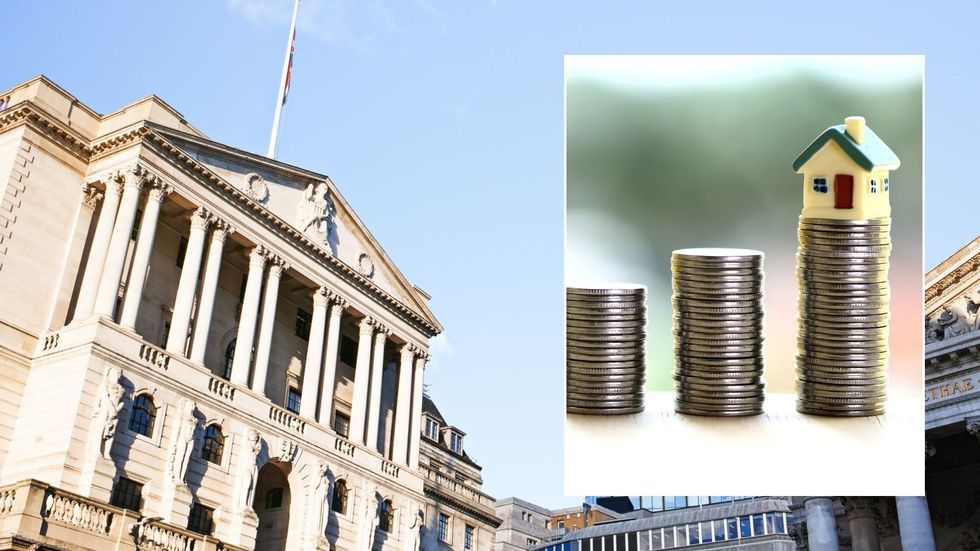UK house prices rise 1.3 per cent in November
PA
House prices have risen for five consecutive months
Don't Miss
Most Read
Latest
UK house prices have hit a new record high of £298,083 - but millions are warned of mortgage payment hikes to come.
Property values rose by 1.3 per cent in November, the biggest monthly increase this year, according to Halifax.
The annual growth rate accelerated to 4.8 per cent, up from four per cent in October, reaching its strongest level since November 2022.
However, the Bank of England has warned that approximately 4.4 million UK households could still face increases in their mortgage repayments over the next three years.
The Bank's Financial Policy Committee revealed that around 420,000 households will face mortgage payment increases of £500 per month.
Between one million and 1.5 million people are set to experience a second increase in rates, having already fixed to a higher price since interest rates began rising in late 2021.
 Millions of homeowners are facing soaring mortgage costGETTY
Millions of homeowners are facing soaring mortgage costGETTY Karen Noye, mortgage expert at Quilter said: "This increase in house prices follows a period of market stagnation and reflects a rebound in buyer activity, which has been supported by declining mortgage rates and greater market stability.
“The rise in house prices will offer some relief to existing homeowners who may have been concerned about a prolonged market downturn. Yet, questions remain about how sustainable this recovery might be.
"The Bank of England’s recent decision to reduce interest rates to 4.75 per cent has eased some of the pressure on mortgage holders, but for many households refinancing in the coming months, monthly repayments will still rise significantly compared to previous fixed-rate deals."
About 31 per cent of all mortgages, representing 2.7 million people, will refinance onto a rate of more than three per cent for the first time before the final quarter of 2027.
A typical household rolling off a fixed-rate mortgage in the next two years faces a jump of around £146 per month in payments, down from the previous projection of £180 in June.
Noye explained that the rise in house prices shows "clear indication that the UK housing market is showing signs of resilience despite the economic pressures."
However, she warned that affordability remains a critical issue, particularly for first-time buyers struggling with high borrowing costs and larger deposit requirements.
According to analysts, property prices are likely to rise further in the run-up to April 2024, when the current stamp duty relief ends.
From April 1, the temporary stamp duty relief first introduced by the Conservative Government in 2022 will end with the thresholds at which people start paying this property purchase tax set to revert to the previous levels.
Jonathan Hopper, CEO of Garrington Property Finders, said: "Hesitation has turned to hurry in some parts of the market, especially among first-time buyers racing to complete their purchases before the Stamp Duty thresholds change at the end of March.
“This sense of urgency is prompting some buyers to view in haste and offer high in order to secure a home now and complete their purchase before the tax changes take effect.
“This will be music to the ears of sellers, many of whom have been forced to hold down their asking prices and accept lower offers for much of this year as the supply of homes for sale outstripped demand.
“But this buoyancy - which is pumping up average prices and could easily turn into another ‘Stamp Duty stampede’ as the deadline approaches - is far from universal."
Alice Haine, Personal Finance Analyst at Bestinvest, said that the market could become more muted after April 1 as buyers choose cheaper homes to reduce their tax bills.
Haine said: "Beyond the start of April, the market is likely to be more muted as buyers choose to purchase cheaper homes to reduce their tax bill or negotiate more aggressively to afford their desired property.
"There is also the sting in the tail for second homeowners and buy-to-let landlords who are already contending with the hike in the property tax on second property purchases, which came into effect immediately.
“The Prime Minister has doubled down on his pledge to boost living standards during his parliament and build 1.5 million new homes – measures that have the potential to improve people’s chances of being able to afford a home.
"But the combined effects of the cost-of-living crisis and the higher tax burden of recent years have already dealt a heavy blow to how much money people have left in their pockets after they have paid tax and accounted for inflation."












